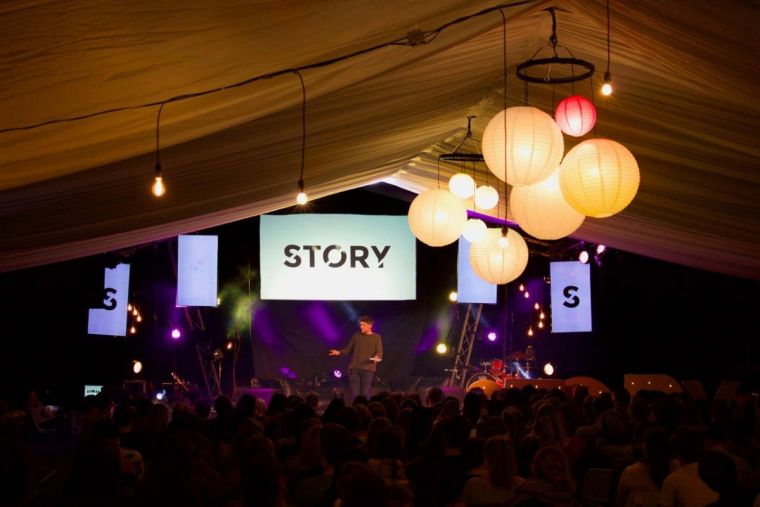Free lunches and Fresher's Week: How UK Christian Unions are stepping out to share Jesus
October is nearly upon us, and while some hearts might be downcast as the reality of autumn-soon-to-be-winter sets in, for one demographic the air is fraught with optimistic possibility.
It's 'Fresher's Week' for those embarking upon university for the first time: beginning their adult lives and heading on a new voyage of education, self-discovery or perhaps not doing much at all. Whatever university may have in store, in Britain there's often one constant – the Christian Union (CU). Fresher's Week offers a slew of opportunities, one of them being a chance to hear – for many, for the first time – what Christianity is all about.

So what are churches and CU's up to in the upcoming (or just passed, depending on where you study) weeks? And in a shifting, increasingly post-Christian culture in Britain, does the evangelistic model need to change?
Katherine, a student and CU committee member at University College London, is seeking to draw freshers in with the question 'Is there something more?' Today, her CU Is hosting an evangelistic free 'lunchbar' with a talk on the very question, while the theme will continue on throughout the year.
And maybe it's just the right question. Peter Dray runs 'creative evangelism' for UCCF (the official body that runs CUs across the UK), a role that involves 'expanding the means of living and speaking for Jesus on campus in a way that is relationally warm, culturally engaged and biblically faithful'.
He says that 10 years ago you could find many students, versed in the 'new atheism' of Dawkins et al, convinced that atheism had all the answers they needed. Now he says, the average student is less strident in such secularism, generally more 'lost, confused' and as such more open to the question of Christian faith. That opens the door for dialogue.
Dray describes a 'huge amount of spiritual openness' that can be well met by thoughtful pitched talks and events. And it seems to be working: just last year saw 12,000 students attending evangelistic Fresher's Week events across the UK.
On recent CU welcome event was titled provocatively: 'What can Christianity offer me that University can't'?'
One offer is constant. For poor students, free food is a staple of Christian outreach, with several groups offering 'freshers feasts', a chance to have fun, build relationships and tell people about CU. And the evangelists are in good company: Jesus was famous for his miraculous mass-catering events.
UCCF is centred on evangelism, as its vision statement puts it: 'To give every student in Great Britain an opportunity to hear and respond to the gospel of Jesus Christ.' But there seems to be a growing awareness amongst CUs across the country of the need for a diverse and engaged form of outreach, that doesn't ignore its creed but goes beyond just telling people what they need to believe.
As an example, consider 'Story', the 'missions week' event launched in 2016 from Durham University's CU. The philosophy of this initiative, which many other CUs have since followed, is to use storytelling, as both a personal testimony and an imaginative tool, to point to Jesus.
It invites audiences not with a threat or assumption but with a question: 'Who are you? What's your story?' – and builds relationship and conversation from there. The creative enterprise was named by the National Union of Students (a secular group) as its 'best student event'.

Charlie Coombs, the president of Durham's CU, says the unprecedented success of 'Story' has encouraged them towards a relational model of outreach that values people's individuality – following again in the footsteps of Christ and his diverse interactions. Durham CU's Fresher's Week will this year be followed by another innovation, a four-week seeker-friendly course titled 'The Search', which again invites questions, relationship-building and connects people with local churches.
Back in London, Katherine agrees that in the past a focus on evangelistic talks that have 'almost been aggressive' might have missed the mark. She's hoping that her CU can be a place where newcomers find 'family' and 'a community that is epitomised by grace', embodying a holistic Christian life and being more than just another weekly club.
Another growing angle of outreach is to the ever-expanding demographic of international students, particularly those with English as their second language. For this group, University can be particularly overwhelming and alienating, and many CUs have made concerted efforts to love and serve such people in practical ways, showing a helping hand and warm invite to foreign soil, and again opening up the possibility of faith to those who may have never been in a church.
It isn't just about reaching 'unbelievers' either. Many Christians might not know about CU or if they can trust it: a well-run Fresher's Week can welcome and connect fellow believers and show them that CU isn't just a weird cult. The popular format of the 'church-search' event offers a vital conduit to help Christians find a church family in their new home.
All in one hectic week, it's a tall order, but one that many mercifully unjaded and energetic university students seem delighted to take on. Outspoken evangelism is always a risk: there'll be the critics and cynics, and Christians too can get it very wrong. But CUs across the country seem to be eager to both share and listen, valuing diversity and learning lessons as they grow.
Dray tells of one fresher student who just last week was invited to church for the first time via CU. He'd never been to church, but felt listened to, followed an invite and by the end of the week was professing faith.
Not a daily occurrence perhaps, but for the many stepping out to greet newcomers in the next weeks, that's why it's worth it.
And they get the free lunch as well.
You can follow @JosephHartropp on Twitter











